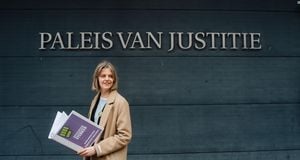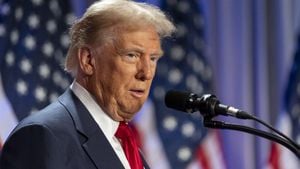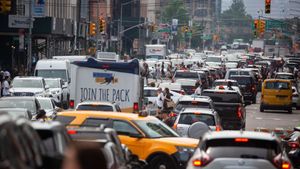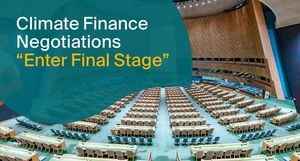The countdown is over, and Rio de Janeiro is buzzing as leaders from the world’s most significant economies converge for the G20 summit, setting the stage for urgent discussions on global challenges. At this year’s gathering, the spotlight is on how to combat hunger and climate change amid heightened geopolitical tensions and the unexpected return of Donald Trump as U.S. president.
Brazil’s President Luiz Ignacio Lula da Silva welcomed attendees at the Modern Art Museum, signaling the beginning of two intensive days of talks. He opened the summit with passionate remarks emphasizing the existential plight of hunger, labeling it as a "stain on humanity.” His administration is spearheading initiatives, including the launch of the Global Alliance Against Hunger, which unites more than 80 countries, multilateral banks, and philanthropic organizations, highlighting the stark reality: "Hunger and poverty are not the result of scarcity... they are the product of political decisions," he stated.
With 150 million people globally pushed to the brink of starvation since the COVID-19 pandemic, the G20 leaders must navigate their complex discussions around food security against the backdrop of the wars ravaging Ukraine and the Middle East.
Yet, addressing food insecurity is just one part of this pivotal summit’s agenda. President Lula’s ambition extends to promoting funding mechanisms for social programs to tackle malnutrition. With 81 nations on board, the Global Alliance is positioned as Lula’s centerpiece initiative, though its broader goals, such as taxing the wealthy, face significant pushback.
This year's summit reflects the high stakes of international diplomacy as leaders straddle pressing domestic concerns with the needs of the global community. Discussions around international taxation, climate reform, and support for war-torn regions are expected to take center stage, especially as the G20 confronts the realities ushered in by Trump’s administration.
Trump's re-election adds layers of complexity, particularly with his calls for economic policy shifts, including potential trade wars and negotiations centered around Russia and Ukraine. His skepticism toward multilateral engagements threatens to unravel cooperative efforts on topics like climate change and global poverty. Observers, including international relations expert Cristiane Lucena Carneiro, note the challenges this poses for reaching meaningful agreements.
While Trump prepares to assume office, the summit also sees notable international engagement. President Joe Biden, attending as America’s outgoing leader, uses the moment to reinforce his administration's commitments, particularly highlighting $50 million pledged to the Amazon Fund aimed at conservation efforts.
The looming shadow of conflict cannot be ignored at the summit. Delegates are braced for delicate discussions around the Ukraine war—recent attacks by Russia add urgency to the calls for ceasefires and humanitarian assistance. Biden’s administration has intensified military support for Ukraine, endorsing the extension of long-range missile capabilities as the war drags on.
Russia’s notable absence, with President Vladimir Putin replaced by Foreign Minister Sergey Lavrov, raises eyebrows. Lavrov’s presence is steeped in controversy as diplomatic tensions remain high, emblematic of the broader struggle over the future of international relations.
Notably, this summit arrives at the backdrop of significant voices downplaying U.S. leadership. The U.K. Prime Minister Keir Starmer, presents his insights, aiming to recalibrate ties with China amid concerns about security risks from Chinese investments. His recent meeting with Xi Jinping during the summit serves as a pivotal moment, reflecting the U.K.’s attempt to forge stronger economic ties regardless of the tensions surrounding global politics.
Yet, this summit also breathes fresh air for dialogues on global cooperation, mirroring Lula’s hopes of stitching back multilateral ties amid growing discontent. Leading diplomats from the G20 engage not just among themselves, but also with the intra-group dialogues stressing the necessity for consensus on shared objectives and solutions.
Amidst discussions on tax reforms aimed at the affluent and reparations for the global south, the summit script is anything but conventional. Key discussions also pivot to green energy transitions, with Brazil seeking to position itself at the forefront of climate policy shifts—a vision outlined starkly against the backdrop of looming conservative rollbacks under Trump’s leadership.
The world awaits as officials wrestle with rich nations stepping up to assist developing counterparts amid rising expectations from global stakeholders. Lula's plea for fiscal justice asserts, “A new financial architecture must permit fair taxation of the ultra-rich.”
Back on the ground, security measures throughout Rio intensified prior to the summit, with Brazilian troops ensuring safety amid prior incidents of unrest. The city’s streets feel electric, as these leaders come together at this unique juncture to deliberate on issues whose resolutions could pan out well beyond economic borders.
Experts remain cautiously optimistic yet acutely aware of the hurdles present. The summing up of discussions culminating in written agreements must resonate with the aspirations of the vulnerable populations—inviting all nations to play their part responsibly.
President Lula remains steadfast, asserting, "This summit is not just about bread, it’s about dignity.” The urgency resonates within the walls of resilience, as negotiators seek to push past the impasses characteristic of international dialogues.
For today’s G20 leaders, articulations on our climate fate and support for vulnerable regions are more than negotiations; they are commitments seeking to change the narrative from words to action. The outcome remains to be seen, yet the potential for impactful resolutions resonates increasingly against the ticking clock of global priorities. Wherever global cooperation might lead, the G20 summit as convened by Brazil this year holds promise, albeit riding on the unpredictable waves of political tides.
With the discussions on the horizon and challenges abound, the focus remains clear: Canadian Prime Minister Justin Trudeau reminds all involved of the age-old truth, "We are only as strong as our weakest link.” The cry for shared accountability rings loudly through the historic city as world leaders carve pathways toward resolutions—how effective they will be, only time will tell.



